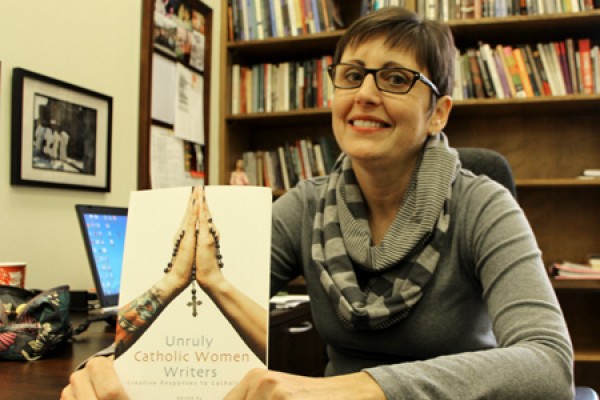 Renee Bondy holds up a copy of the book in which her essay was published.
Renee Bondy holds up a copy of the book in which her essay was published.
Growing up in a fairly liberal Roman Catholic family in the 1970s, Renée Bondy only ever heard stories about severe nuns in black habits, but still learned to dread them in the same way a child might fear an unseen monster under her bed.
The nuns she grew up with played acoustic guitar, looked like Joan Baez, and wore comfortable shoes and groovy wooden crosses on leather lanyards.
Yet it seems ironic that it was those nuns of her youth – who have become a source of lifelong academic fascination – inspired her to become a feminist, and ultimately, albeit unintentionally, to reject the church.
A full-time lecturer in women’s studies who teaches courses on women and religion, women’s sexuality, and the history of women’s movements in North America, Dr. Bondy submitted a short piece of creative non-fiction to a recently published book called Unruly Catholic Women Writers: Creative Responses to Catholicism.
An anthology of short stories, poems, personal essays, and drama, the contributors describe women’s struggles with Catholicism, but also complicate contemporary understandings of women’s relationships to their faith.
The only Canadian to be included in the book, Bondy – who grew up in Amherstburg – specifically recalls in her essay 'My Soul Sisters' the influence that nuns had on her as a young girl, noting that “they were among the most engaged feminists I’ve known in my lifetime,” even though they may not have described themselves as such.
“I find them really fascinating in that many are very devout, but many of them also find room for a critical feminist perspective within what is arguably not a very feminist institution,” she said.
Bondy said it was the modernizing reforms enacted by Second Vatican Council of the early 1960s that allowed nuns who believed in social justice and the ideals of feminism to begin exploring ways of expressing themselves within the rigid structures of the church.
“Nuns changed a lot,” she said. “The intriguing thing about their stories was how they navigated that change.”
No longer a practicing Catholic, Bondy said she and many other women like her are still heavily influenced by the culture of the faith they were raised with, but simply aren’t willing to participate in an institution that remains so exclusionary towards women.
And while she’s not certain the sisters who taught her could have predicted her mistrust of the church, she suspects that they wouldn’t disavow her either.
Bondy said a reading for the book may be held somewhere in Michigan in early 2014.
